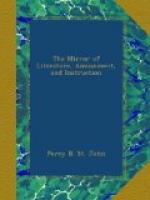The star that watches, pure and lone,
In yon clear heaven so silently,
Looks trembling from its azure throne
Upon thy beaming glories nigh;
And yields to thee first-born of day,
Reluctantly its heavenly sway.
Sweet spirit, with that early ray,
Which steals so softly through
the gloom,
Trembling and brightening in its way,
What beauties o’er creation
come;
Ere thy unclouded smiles arise
In all their splendour through the skies.
The rosy cloud—the azure sky,
Earth—ocean, with
its heaving breast,
Where thy bright hues reflected lie,
And there in varying beauty
rest,
Rejoice in thee; and from the grove,
To hail thee, bursts the voice of love.
Eternal beauty round thee dwells,
And joy thine early steps
attends,
While music wildly breathing swells,
And with thy gales of perfume
blends:
Pure, beautiful you smile above,
Like youth’s fond dreams of hope
and love.
Thy skies of blue, thy beaming light,
Thy gales so balmy, wild,
and free,
Thy lustre on the mountain’s height,
Have charms beyond all else
for me;
Whilst my glad spirit fain would rise
To hail and meet thee in the skies.
Sylva.
* * * * *
NOTES OF A READER.
BRITAIN’S HISTORICAL DRAMA.
We understand Mr. Pennie’s design, in this volume, to be the chronological arrangement of certain incidents of each king’s reign in a series of National Tragedies. There are four such tragedies in the present portion, commencing with Arixina in which figure Julius Caesar, Cassfelyn, and Cymbaline, and extending to Edwin and Elgiva: the titles of the intervening pieces are the Imperial Pirate and the Dragon King. There is much wild and beautiful romance in the diction, but we take the most attractive portion to be the lyrical portion, as the Chants, Dirges, and Choruses. We recommend them as models for the play-wrights who do such things for the acting drama, and if the poetship to a patent theatre be worth acceptance, we beg to commend Mr. Pennie to the notice of managers. The poet of the King’s Theatre figures in the bills of the day, and yet he is but a translator.
It is difficult to select an entire scene for quotation, so that we take a specimen from Arixina:
Chorus of bards.
Dirge.
Semi chorus.
Mightiest of the mighty thou!
Regal pearl-wreaths decked thy brow;
On thy shield the lion shone,
Glowing like the setting sun!
And thy leopard helmet’s frown,
In the day of thy renown,
O’er thy foemen terror spread,
Grimly flashing on thy head.
Master of the fiery steed,
And the chariot in its speed,—
As its scythe-wedged wheels of blood
Through the battle’s crimson flood,
Onward rushing, put to flight
E’en the stoutest men of might,—
Age to age shall tell thy fame;
Thine shall be a deathless name!
Bards shall raise the song for thee
In the halls of Chivalry.




